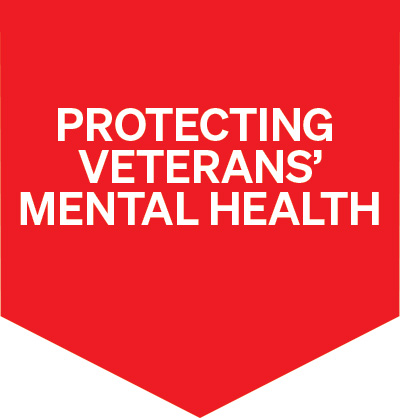Strength,
Stoicism
and Stigma

By Heather McCall
Sometimes, important work comes about in an unanticipated way. At least that’s been the experience of psychiatrist Janet Ellis (PGME ’11), who never expected to be exploring military veterans’ mental health in a first-of-its-kind role in Canada.
Twelve years ago, as a new staff psychiatrist at Sunnybrook Health Sciences Centre, Ellis started seeing patients from the hospital’s Tory Trauma Program — the oldest and busiest trauma centre in Canada.
“I was seeing people who weren’t able to leave home after a car accident because they couldn’t handle the sound of traffic, or because an ambulance siren would trigger flashbacks and nightmares for them,” she says. The experience propelled Ellis into a new area of study, about how people manage trauma, instead of her previous focus on psychosocial oncology.
After six months of attending Sunnybrook’s trauma ward rounds, she began treating more patients with post-traumatic stress disorder (PTSD). Those patients included public safety personnel, such as firefighters, paramedics and police officers. Ellis noticed their behaviour was different than those who had experienced acute trauma from a single incident. For public safety personnel, PTSD was often deep-seated and insidious, and the result of regular exposure to traumatic scenes over time. Ellis determined that, more often than not, the patients’ PTSD symptoms would be largely ignored until they became unmanageable.
“Unfortunately, this is the worst-case scenario for someone with PTSD,” she says. “The longer you avoid treatment, the more difficult it becomes to treat. It’s a vicious cycle.”
In 2022, Ellis learned about a new opportunity in which she believed she could use her expertise in treating PTSD in a new way: as the inaugural Professor of Veteran Mental Health, a donor-funded professorship in the Temerty Faculty of Medicine’s Department of Psychiatry. As Ellis explains, members of the Canadian Armed Forces often have repeat exposure to traumatic events but may avoid care due to the stigma of being seen as weak within the military culture and the fear of not being able to serve on missions.
“Historically, military culture has been characterized by strength and stoicism,” says Ellis. “It can feel stigmatizing for a current or former member of the Armed Forces to acknowledge their difficulty in coping with the stresses of their work.”
These challenges are compounded by other unique barriers that members of the military face, she adds. For example, a military member’s eligibility to serve can be affected by a requirement for a prescription drug, such as those used to treat anxiety or depression. Ellis also notes that even when veterans with PTSD do seek out support, some may struggle to navigate access to specialized supports. Or, they may encounter barriers with civilian health care providers. These providers may have little understanding of the military’s unique culture, says Ellis, so they may be ill-equipped to assess or deliver the specialized care that veterans need.
Through the professorship, Ellis is seeking to identify who is most at risk of encountering barriers to health care, and how to ensure they don’t fall through the cracks. That’s why a major focus of Ellis’ current work is collaborating with various organizations to make it easier for veterans to seek the help they need from public and military service providers, and to improve system responses.
One example is the Toronto Police Service, which launched the Military Veterans Wellness Program in 2022 to educate and train police officers to respond better to veterans in crisis. Peter Collins (PGME ’89), an associate professor of forensic psychiatry at Temerty Medicine as well as a Canadian Armed Forces veteran who served in Afghanistan, introduced Ellis to the program. Ellis hopes to study the program’s impact and any learnings that can be translated to the broader health care system. Ultimately, the greatest impact Ellis says she can have in her new role is to lead much-needed changes to veteran access to effective health care, in all spheres.
“That work means identifying veterans in health care settings, understanding their experience and culture, and acknowledging their specific health requirements,” she says. “The Canadian health care system has a long way to go when it comes to addressing veterans’ needs, and that work is crucial.” •